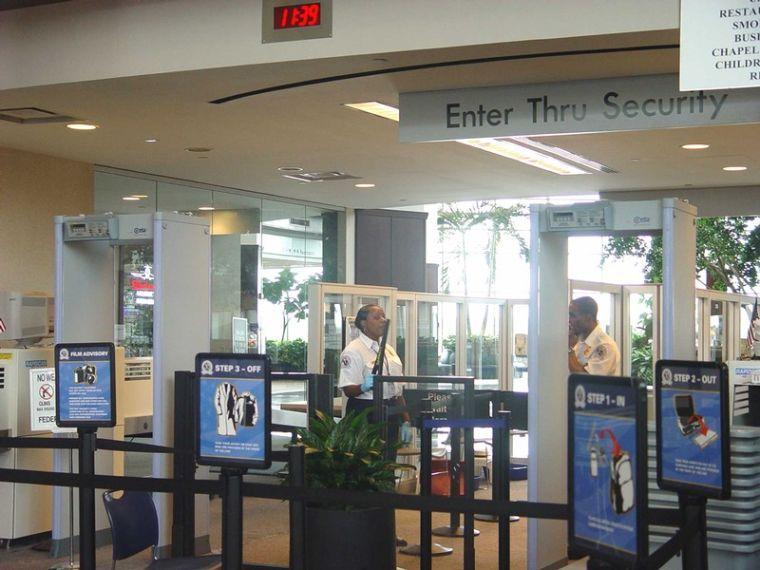Suggested head: Travelers sign rights away for faster airportscreening
For frequent travelers, beefed up airport security can lead towasted time and money.
But the federal government has proposed a new “registeredtraveler” program at airports around the country in an attempt toalleviate some of the hassles of security screening.
If travelers agree to a specific background check, theTransportation Security Administration will issue an identificationcard that contains a reading of their iris and fingerprints.
The ID will let travelers enter through a special screening lineand significantly decrease frequent fliers’ chances of beingsubject to additional screenings.
It will not let travelers bypass the traditional metal detectorand X-ray inspection.
Neither Baton Rouge Metropolitan nor Louis Armstrong New OrleansInternational Airports will be taking part in the pilotprogram.
Amy Von Walter, a TSA spokesperson said the trail program hasmade agreements with five airports to serve as test sites.Northwest Airlines at Minneapolis-St. Paul International Airportbegan registering travelers for the 90-day trial yesterday.
Von Walter said TSA, which is a subset of the Department ofHomeland Security, is looking for about 10,000 volunteers toparticipate in the program.
“Northwest has extended the offer to its platinum elitemembers,” Von Walter said.
Von Walter said the program is limited to U.S. citizens or legalresidents who fly at least once a week. The traveler only will beable to use the registered traveler benefit at their homeairport.
If travelers meet those requirements, volunteers will submittheir name, address, phone number, date of birth and biometricinformation from a fingerprint and iris scan. TSA will take thisinformation and conduct extensive “terror-focused” backgroundchecks.
Von Walter said they are mostly looking for outstanding “wantsand warrants” in the background searches.
With the new system comes a growing concern that the governmentmay breech individual’s right to privacy.
But Von Walter said it is important to note that these arestrictly volunteers who are willing to turn over some of theirrights for swifter travel.
Von Walter also said TSA is bound by the Privacy Act of 1974,which prohibits the agency from sharing any information with anyother governmental group.
“We have technical safeguards in the program,” Von Waltersaid.
The program will have an internal auditing system which willensure only a limited number of TSA employees have access to thetraveler’s personal information.
The New York Times published an editorial on June 23 voicingapprehensions about TSA’s lax approach to privacy in the past. Theeditorial stressed that TSA must be sure the information receivedfrom registered travelers is not shared with other governmentalagencies.
The editorial cited a General Accounting Office report filedlast March which found TSA to be slow to address issues ofpassenger privacy and accuracy within their own system.
The Department of Homeland Security released a report inFebruary about privacy violations that occurred in a transfer ofinformation between a jetBlue Airways passenger and Department ofDefense contractor, Touch Concepts.
The information was transfered for use in a background search,and TSA employees were said to have major involvement.
Although the DHS filed no violation against the employees, thereport said “the TSA employees involved acted without appropriateregard for individual privacy interests or the spirit of thePrivacy Act of 1974.”
Some University students acknowledged the need for the program,but also expressed concerns.
Stephanie LeBleu, a mass communication senior, said the programwill be convenient for frequent travelers, but she would not feelcomfortable turning over her rights to the government.
“I’m skeptical to begin with,” LeBleu said. “It’s too much forthe government to know.”
She also said she is weary of the government having thisability, then taking it too far.
“Sooner or later we’ll have to scan our eyes to get into thelibrary,” LeBleu said.
But Robert Bogan, an undecided freshman, said the program issmart, and the government should utilize the advanced technology ithas available.
Bogan said if a person willingly provides private information,there is no invasion of privacy.
He also said he trusts that the government will be responsiblewith the private information.
“If you travel a lot, and you need to get through securityreally quickly, it seems good to me,” Bogan said.
Travelers Sign Rights Away for Quicker Airport Screening
June 29, 2004




